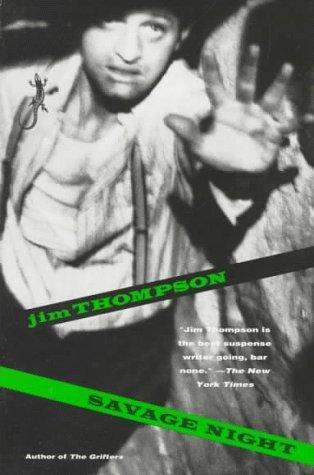Country: USA
Genre: Noir
Pages: 149
Synopsis:
Carl Bigelow is a student moving into a boarding house or so it seems. Charlie "Little" Bigger is a much badder man. In fact, he's one of the best hitmen in modern history.Could they be the same guy? They seem to be. Bigger has a contract to eliminate Jake Winroy, an employee of his boss that did some irreparable mistakes. Bigelow happens to live in the same boarding house. You know how these things go...
I was't an old man by a hell of a long ways, but I got to wondering whether the way I felt had anything to do with getting older. And that led into wondering how old I really was, anyway, because I didn't know.
If there's a heaven for manly writers, Ernest Hemingway presides but Jim Thompson has a seat on the administration council. Nobody even comes close to the grit, aggression and all-around crazy vibe of his novels, except maybe contemporary madman Anthony Neil Smith, who seems to thrive on being the most violent writer alive. "Savage Night" is a term that comes back often in noir literature, in the stories of Smith himself and Allan Guthrie amongst other. But the term originated from Jim Thompson. I was curious to see the origin behind such a haunting term. Turns out the original SAVAGE NIGHT proudly wears its title. Especially the "Savage" part. Jim Thompson was in great writing shape in 1953, so blood pours and heads butt on the page.
The form is admirable. Ever watched Steven Soderbergh's THE LIMEY? Remember how weird the editing cuts were? You never knew exactly if you were in the future, the past or a fantasy? This is what SAVAGE NIGHT reminded me of. Thompson throws in very subtle clues throughout the narrative as to make you question whether Bigelow and Bigger are the same guy. The obvious answer is yes, but if you go deeper, it's not that obvious at all. At least not to the characters and Thompson takes pleasure in concealing the truth to his readers too. The Bigelow/Bigger parts are clearly cut and the protagonist acts very differently in both. Bigelow knows Bigger but the only thing bigger knows is killing. He's a savage with a pronounced taste for blood.
Reading SAVAGE NIGHT, I really was baffled by the fluidity with which Jim Thompson managed all the variables of his novel. The premise looks simple. It's a hit, a contracted killing. But the Bigelow/Bigger duality isn't. That's "psycho noir" for you and Jim Thompson understood and mastered this idiom and boiled it down to 149 pages of pure hell in SAVAGE NIGHT. He spares no brutality to his main protagonist, although he IS the main purveyor of brutality throughout the novel. I'm not going to spoil it, but the ending is absolutely brilliant. It was also in THE GETAWAY and Jim Thompson just has a knack for making abstract but relevant endings. It was surreal and cringe worthy. Rare are the endings who live up to their stories, but with Jim Thompson, this isn't a concern.
If you've been around the East much, you've seen a lot of houses like it. Two stories high but looking a lot taller because they're so narrow in depth; steep-roofed with a chimney at each end and a couple of gabled attic windows about halfway down. You could gold-plate them and they'd look like hell, but they're usually painted in colors that make them look twice as bas as they normally would. This one was crappy green with puke-brown trimming.
Not only SAVAGE NIGHT is an origin story for the follow-up titles that bore the same name, but it's an origin story of Bible-like proportions to psycho noir in general. It's a short novel, technically a novella, but Thompson's protagonist goes through hell from cover to cover. It's bleak, intense and doesn't have nearly enough credit in Jim Thompson's legacy (and it has some credit already). If you're looking for the purest noir experience you can have, put SAVAGE NIGHT on top of your list. It's very clear it's not your common crime fiction. It's as bleak and heartless as it gets. Not everybody's cup of tea, but if you're as into heartless fiction as I am, this will blow your socks off. SAVAGE NIGHT is my fourth Thompson novel and I'm only starting to understand how important he is to the genre.
FOUR STARS

